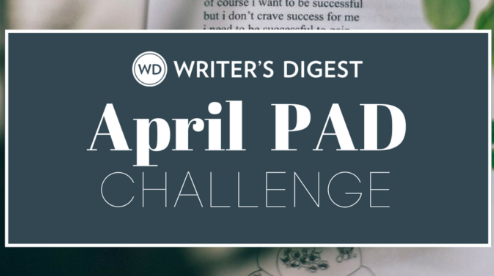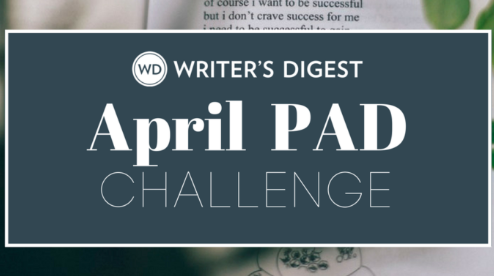How to Complete a Poem: A Mini Survey
Award-winning author Amy Gerstler conducts a mini survey of working poets to get a sense of how they complete the poems they write.
OK. You've wrestled with your poem like Jacob with his angel. Whether it hit you like a bolt of lightning or whether you've been chipping away for months, now you're wondering: Can I stick a toothpick in my poem to tell if it's DONE?
Poets struggle to discover how to write each particular little darling. How do they know when their poem has found its final form? I emailed a handful of poets I admire to ask just that.
The poets quoted here discuss two distinct but closely linked considerations. One is finding the right ending for a poem (where it lands, last note sounded), and the other is determining when a poem is finished overall. Because crafting an apt ending and deciding when a poem is completed can be interdependent, this text covers both.
When WB Yeats claimed "... a poem comes right with a click like a closing box" he may have been talking about both endings and a poem's overall sense of realization.
Naomi Shihab Nye's poem How Do I Know When a Poem Is Finished leans into an extended metaphor of poem as anthropomorphized room. Here are the first two stanzas:
When you quietly close
the door to a room
the room is not finished.
It is resting. Temporarily.
Glad to be without you
for a while.
Her room/poem has capacity for gladness, and a yearning to be free of its fussing writer for a while. Because Shihab Nye implies that a poem, like a room, is a separate entity from its poet, it follows that the poet must allow themself to be guided by the poem's needs, its emerging personhood if you will, during composition. Her poem ends like this:
When you return,
you might move the stack of books,
freshen the water for the roses.
I think you could keep doing this
forever. But the blue chair looks best
with the red pillow. So you might as well
leave it that way.
The closing sentiment, "...you could keep doing this/forever.../So you might as well//leave it that way" could put Shihab Nye, at least in this poem, in the camp of poets who agree with Paul Valery's adage, “A poem’s never finished, only abandoned.”
In his response to my reach out email, Irving Feldman quoted Valery as above, then wrote, "My version: A poem is an ideal object made by practical means." David Trinidad's response to my query flipped Valery's dictum, observing that his poems are finished when they abandon him: "A poem is done when it stops bothering me."
Brendan Constantine's comments align with Shihab Nye's in sharing the notion of a poem's apartness from the poet, as something to be discovered, though Constantine acknowledges that for him, this is illusory. "I must say more and more I feel like the poem already exists in some strange way. I know it doesn't but that's the nature of poetry, is it not--to be uncanny." He gave credence to the power of a poem's ending to color its sense of overall wholeness, "...one of the first things we forget, right about the time we write our third poem, is that the whole thing is the ending. No matter how enjoyable it may be to read from the beginning to end, the complete poem is an after-feeling."
For E. Ethelbert Miller, there's an element of self-knowledge in knowing when a poem is done. And he raises the question of whether finding a reader has a role in a poem's ultimate completion. "Sometimes my poems are not finished until they are out of the pot and inside someone's ear... My poems are not finished until they sound good and look good on the page. Over the years I've become a better writer and know how to escort a poem to its desired destination. I trust my creative process more. I know my voice. When I can hear and see myself in a poem then I know it's finished."
Victoria Chang hearkened back to Irving Feldman's comment about a poem being "an ideal object made by practical means" when she wrote, "I'm sure I could have written this poem many ways...but at some point, maybe this is the best I can do right now, with the resources I have...." She went on to say, "...for me, a poem and a poem's ending are more about the act of experimentation versus the result. Did I enjoy playing with it is actually more important to me than is it a successful poem or do people like it."
Elaine Equi did what I hoped at least one of the surveyed poets would do: She questioned the concept of completion. "To be honest," she wrote, "I don't know that everything needs to be finished. From Sappho I learned that sometimes a fragment is enough. To Coleridge, 'Kubla Khan' was unfinished."
"I never really know when a poem is finished,” said Kevin Prufer. "When I do readings from my books, I find myself making changes, editing, revising, even years after a poem or book has been published... Because of this, I find it good to have good friends who can tell me to stop fussing with a poem before I ruin it with quandrainess and puzzlement."
Joanna Fuhrman seconded Prufer's emotion re: having a trusted hive mind weigh in on a poem in progress, though she doesn't take such suggestions as gospel. "I usually rely on my writing group to tell me when my poems are finished, but sometimes they say it's finished, and I end up changing it a lot anyway."
Brooke Harries sent a three-and-a-half-page poem on our subject, which I wish could be printed in its entirety. Here's a smattering of quotes from her poem. "When it feels like it's having fun of its own volition and doesn't need me anymore//When I don't know who wrote at least one of its lines but somehow it was me//When I know I could say a few different things in defense of its themes to a genius or bully//.
"The truest and least helpful answer I can think of is: You never know" wrote Lawrence Raab. "More useful may be: When the poem can go out in the world and speak for itself without any intercession on your part." Another of his thoughts chimed with Shihab Nye's notion of poem as room...for Raab, it was poem as house. "...for me a more useful...question might be: How do I know when a poem has entered that stage of its composition where I feel confident that I can find a way for it to end? And the answer would be: When the architecture of the poem can support what I want to have in it. To press on the metaphor: at that point I have a roof, and windows, and a front door, but not yet the second door that I know will be necessary. The house isn't finished, but I've made enough of it to be reasonably sure I'll be able to complete it. And because it's not completely finished it can still get better."
So maybe there's hope for all of us writers teetering in quandrariness and incompleteness. Keep building!
Check out Amy Gerstler's Is This My Final Form? here:
(WD uses affiliate links)




